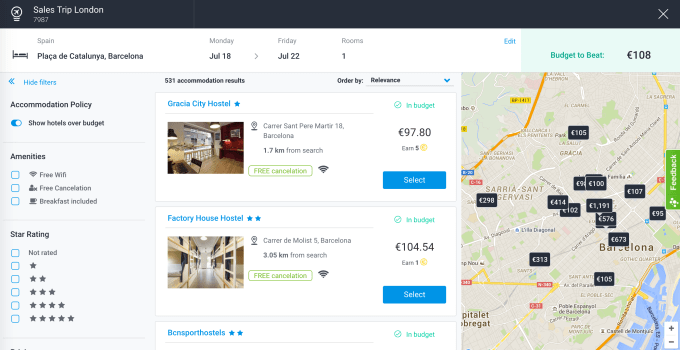Barcelona based TravelPerk, a business travel booking platform founded last year by a team of ex-Booking.com employees, has closed a $7 million Series A round of financing led by Spark Capital. Additional investors including Sunstone Capital and existing backer LocalGlobe. As part of the financing, Spark Capital’s Alex Finkelstein is joining TravelPerk’s board.
TravelPerk started last year with a basic idea to create a rewards program based around dynamic budgeting for business trips, launching a first version of its product in September. The idea being that people who booked below the budget for a trip would personally pocket half of the savings being generated for the business — along the lines of YC-backed Rocketrip.
But at that point, says CEO and co-founder Avi Meir, the startup started talking with companies it was hoping to target — and found there were a lot more problems associated with booking business travel which it could be focusing on.
“The first target, the natural target for us is fast growing companies, Series B to C funded companies in Europe. These kind of companies we’ve discovered have different problems than the one we were trying to solve,” he tells TechCrunch.
TravelPerk’s intended user is the person within its target companies who is tasked with booking travel for others.
“This person had really different problems and it was mainly around organizing, having one place to book the travel, getting the invoices, getting a dashboard with transparency into where everybody is at any given moment, etc. It was less around reward and cost reduction,” he says, explaining how the idea evolved into a more holistic view of the need to streamline and simplify business travel booking.
The second version of TravelPerk launched in January, aiming to fix the bundle of business travel booking problems it had uncovered by, for example, filtering bookable content based on the user’s travel policy and offering a range of payment options (with processing powered by Stripe) — although it still retains a dynamic budgeting feature, as an add on that aims to help companies create realistic budgets based on local demand, season etc.
Meir says the budget feature is generating around a 30 per cent reduction in costs for users just because the platform foregrounds what is a “fair budget” for a given trip.
But the wider problem with the space TravelPerk is attacking is that existing corporate travel booking platforms are outdated and unpleasant to use, argues Meir, who reckons a third phase of business travel booking systems is coming down the pipe — after the original travel agent booking model that arose in the 1950s and 60s, via companies like American Express. Followed by Internet companies, like Concur and Egencia, taking the offline product and putting it online — with all the UI hoariness that implies.
Meir says the opportunity now is to simplify and streamline business travel booking systems, applying the same kind of ease-of-use principles found in consumer booking platforms to upgrade the experience and speed things up — generating cost savings in the process.
He touts TravelPerk having just hired one of the lead UX designers from Skyplanner, and says it’s likely to recruit more people from consumer brands, focusing not just on UI but “on every aspect of how you interact with the product” — to achieve what he dubs the “consumer grade” ease of use of an “Amazon experience or Booking.com experience”.
“If you look at Egencia the product is really not up to what today’s travelers expect,” he argues. “People expect a consumer grade experience from the product they are interacting with.”
A narrower range of inventory options is another disadvantage of older corporate business travel booking platforms, according to Meir. TravelPerk is getting its inventory direct from Expedia and booking.com, which means it’s pulling from the same pool of cost options consumers can get.
“The flight options and the hotel options [users] get from Egencia are not broad enough and they tend to find better options going to booking.com or Expedia,” he claims. “So when we look at it we say can we build a tool that has the good parts from booking/Expedia — from the consumer online travel agencies — with the kind of control, the ability, payment options, invoicing etc that an organization needs? So it’s really a new category of business travel agencies that we are trying to create.”
Meir says the overall aim for TravelPerk to offer a “one-stop-shop and one click checkout” for all business travel booking needs — from travel and accommodation options to other things business travelers might need like meeting rooms and even restaurants. In terms of startup competition he name checks YC-backed NexTravel as another newcomer thinking along similar lines.
Consumers are also used to using software for free, and TravelPerk is carrying that key notion over to its business travel booking space too: the platform is free to use and will remain “free forever”, says Meir — dubbing that a “strategic decision”.
Its business model is instead based on taking affiliate commissions on bookings. It also has its eye on building a data-based revenue stream when it’s in a position to offer its users analytics on their trips and travel, further down the road.
At this nascent stage TravelPerk has just 20 customers — and Meir concedes they are smaller than the average Egencia customer. However he says the ambition is to scale up to serve bigger entities too. “Going forward I would say we would be aiming maybe up to €10 million in yearly travel spend would be the target.
“At one point we will be competing directly with Egencia,” he adds.
The $7 million Series A follows a $1.5 million seed led by former Index Ventures partners, Saul and Robin Klein, which TravelPerk took in two tranches — the lion’s share last summer, followed by half a million two months ago. The fast following Series A is down to being actively courted by Spark Capital, according to Meir.
“With this seed round we had enough runway to get to interesting results… [But] I know how unique it is to have the partner fly over and be pitching you to do an A round. We were basically able to set the terms for the round so it was all really a no brainer,” he says.
The new funding will be principally used for growing the team, initially mainly focused on product development, followed by hires on the commercial side to underpin its growth plans — with the startup aiming to expand from Europe to the US and Asia. “We have very big ambitions globally so we need a very solid team to execute on it,” adds Meir.

